37 Signs You’re Still Carrying the Weight of an Unloved Childhood
Let’s be honest—childhood shapes so much of who we are, doesn’t it? From the way we handle emotions to how we navigate relationships, those early years leave a lasting mark. But what happens when love, support, and validation are replaced with criticism, neglect, or indifference? Spoiler alert: it shows up in ways you may not even realize.
If you’ve ever caught yourself wondering why you struggle to set boundaries, crave constant reassurance, or avoid conflict like it’s your full-time job, you’re not alone. Many of these behaviors are quiet echoes of an unloved childhood—little clues your past is still tagging along for the ride.
But don’t worry, this isn’t a pity party (we don’t do those here). Instead, think of this as a compassionate deep dive into 37 tell-tale signs your inner child might still be raising their hand for attention. Because understanding where we come from is the first step toward rewriting where we’re headed.
1. Walking on Eggshells
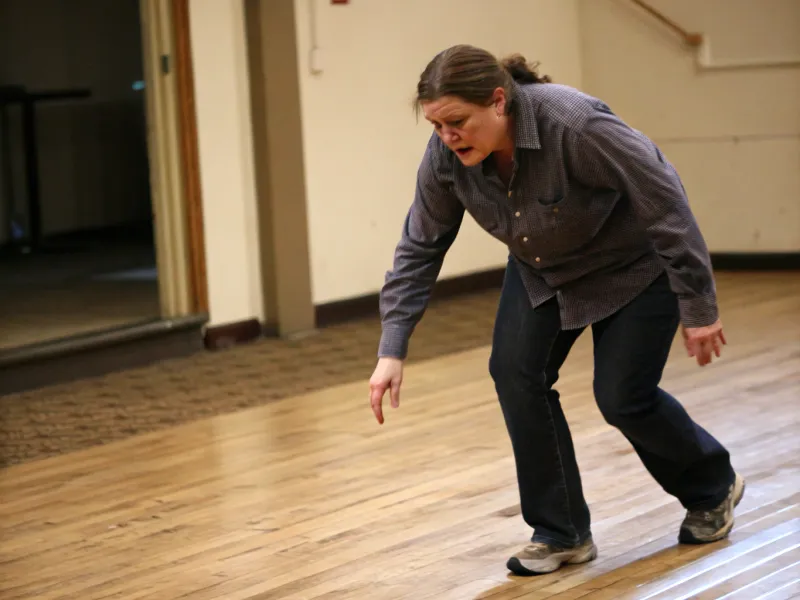
Have you ever felt like the ground beneath you is made of fragile glass? Constantly cautious, never sure when the next crack will come. Walking on eggshells often stems from a childhood where love felt conditional, where harsh words flew like unexpected storms. It’s like living under a sky that can’t decide whether to rain or shine. You find yourself constantly gauging the atmosphere, predicting moods, and adapting like the world’s best weather forecaster.
Your internal dialogue becomes a never-ending debate team, weighing each word and action, striving to avoid setting off an unpredictable response. This hyper-vigilance can be exhausting, never letting your guard down for fear of disappointment or conflict.
The key to finding peace is recognizing that the sky has cleared. It’s safe to put down the umbrella and walk freely. Reassure yourself that today, love is unconditional, whether it’s self-love or the love you receive from those around you. Practice deep breaths and remind yourself: you’re no longer in a storm.
2. Avoiding Conflict at All Costs

Picture this: a bustling office, voices rising and opinions clashing, and there you are, quietly retreating into your own bubble of calm. Conflict? No, thank you – not today, not ever. Avoiding conflict can often be a signature behavior rooted in a childhood devoid of nurturing love, where arguments were not just debates but battles with emotional casualties.
This avoidance becomes a protective shield, a way to keep the peace at any cost. It’s easier to stay silent, to nod along, rather than risk the turbulence that disagreement might bring. But here’s the thing: avoiding conflict doesn’t make it disappear; it just buries it deeper, like sweeping dust under the rug.
Finding your voice means learning that expressing yourself doesn’t have to lead to disaster. Engage in small steps, like sharing your opinion on a minor issue. Realize that not every disagreement is a war, and your voice, just like everyone else’s, deserves to be heard and respected.
3. Over-Apologizing

Sorry for existing, sorry for breathing, sorry for… well, everything. Does this sound familiar? Over-apologizing is like carrying around a bouquet of apologies, handing them out like free samples. This tendency often stems from a childhood where love was scarce, making every mistake feel monumental, every misstep a reason to beg for forgiveness.
Apologizing excessively becomes second nature, a reflex almost, as if saying ‘sorry’ is a magical spell to smooth over the rough patches. But here’s a little secret: it’s okay to exist without constantly apologizing for it. The world won’t implode if you let go of that unnecessary guilt.
Practice holding back those automatic apologies unless they’re truly warranted. Embrace the idea that you are worthy of space, that you can make mistakes and learn from them without having to beg for pardon. Remember, confidence isn’t about never making mistakes; it’s about knowing you’re still lovable when you do.
4. Difficulty Trusting Others

Trust: it’s like a fragile heirloom passed down through generations, easily shattered but hard to repair. For those of us who’ve experienced an unloved childhood, trusting others can feel like handing over a delicate piece of ourselves, fearing it might get broken.
This difficulty isn’t about paranoia or cynicism; it’s a deeply rooted self-protection mechanism. If love was conditional or absent, trusting anyone to cherish that heirloom becomes a colossal leap of faith. Every relationship might feel like a gamble, with stakes too high to risk.
Healing starts with small steps. Begin by recognizing trustworthy traits in those around you, no grand gestures needed. Allow yourself to open up incrementally, testing the waters with small disclosures and watching how they’re handled. Trust is built, one brick at a time, until it forms a sturdy bridge connecting you with others without fear.
5. Perfectionism

Ah, the pursuit of perfection—a double-edged sword that glistens with both ambition and anxiety. For those who grew up feeling unloved, the journey to perfection is often fueled by the desire to earn approval, to finally hear that elusive ‘you’re enough.’
Perfectionism can masquerade as a badge of honor, yet it’s a heavy one to bear. It whispers lies of inadequacy, convincing us that any flaw, any tiny crack, is evidence of failure. But here’s the kicker: perfection is a mirage, a shimmering illusion just out of reach.
Learning to embrace imperfection is liberating. Start by celebrating small victories, like finishing a project or taking a well-deserved break. Recognize that flaws are part of the masterpiece that is you. Remember, the world needs your uniqueness, not an impossible ideal.
6. People-Pleasing

People-pleasers unite! You know who you are—the ones with the constant smiles, always ready to lend a hand, even when your metaphorical gas tank is running on empty. This behavior often grows from the soil of an unloved childhood, where pleasing others was a way to earn the affection that seemed so elusive.
But there’s a fine line between kindness and losing oneself to the demands of others. People-pleasing can become a full-time job, with little room left for self-care or personal desires. It’s like running a marathon, but you forgot to lace up your shoes.
Learning to say ‘no’ is a superpower. It’s okay to prioritize yourself and set boundaries. Practice small acts of self-care, like taking a quiet moment for yourself each day. Your worth isn’t measured by how many people you please, but by how well you love and respect yourself.
7. Fear of Abandonment
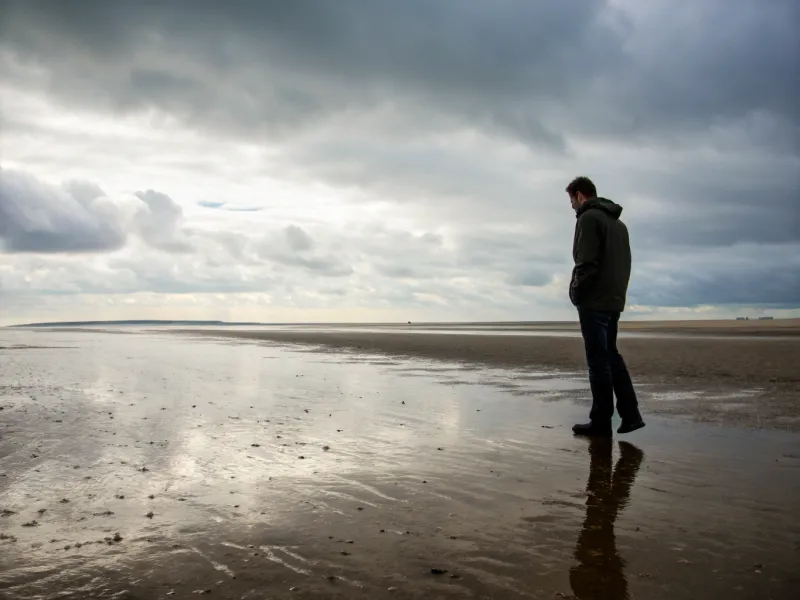
The fear of abandonment can feel like a shadow that never quite leaves your side. It whispers fears of being left behind, of being unloved, echoing the sentiments of a childhood where love was a fleeting thing, as unpredictable as the tides.
This fear often leads to clinging tightly to relationships, sometimes to the point of suffocation. There’s a constant worry that expressed needs or desires might push others away. It’s like walking a tightrope, fearing any misstep could lead to a fall.
The journey to overcoming this fear is gradual. Start by cultivating a strong sense of self-worth, independent of others’ validation. Engage in relationships that emphasize mutual respect and open communication. Remember, love should feel like a safe harbor, not a stormy sea.
8. Self-Criticism

If you’ve ever found yourself staring into a mirror, nitpicking every detail, you know the sting of self-criticism. Born from a childhood where love was scarce or conditional, this behavior can become an internal soundtrack, playing on repeat.
Self-criticism is like wearing glasses that magnify flaws and minimize strengths. It tells you that you must be flawless to be deserving of love and acceptance. But the truth is, no one is perfect, and that’s perfectly okay.
Combatting self-criticism involves altering your inner dialogue. Begin by acknowledging your strengths and achievements, no matter how small they seem. Engage in positive affirmations and remind yourself daily that you are enough, just as you are. Remember, the mirror doesn’t reflect your worth—it’s your heart and soul that do.
9. Emotional Numbness

Imagine walking through a vibrant world painted in grayscale. Emotional numbness, a common residue from an unloved childhood, leaves you feeling detached, as if watching life through a window, unable to fully participate.
This numbness can be a protective layer, a way to avoid the pain and disappointment that emotions can bring. It’s like wearing a heavy coat, shielding you from both the cold and the warmth. But living this way means missing out on the beauty of genuine connection and joy.
Begin to thaw this emotional frost by gently exploring your feelings. Allow yourself moments to feel, without judgment or fear. Gradually, engage in activities that evoke happiness and vulnerability. Remember, emotions are the colors that paint your life’s canvas.
10. Hyper-Independence

In a world where reliance felt risky, hyper-independence becomes a suit of armor. It’s the belief that you must do everything alone, never leaning on others for support. For those with an unloved childhood, this behavior can be a testament to their resilience but also a barrier to connection.
Hyper-independence whispers that asking for help is a weakness, that vulnerability might lead to abandonment. It’s about constructing walls so high, only to find yourself lonely at the top. But even the strongest among us need a hand to hold sometimes.
Learning to rely on others is not a sign of weakness, but of strength. Start small by asking for help with minor tasks. Acknowledge that sharing life’s burdens creates space for deeper relationships and mutual growth. Remember, you don’t have to climb every mountain alone.
11. Difficulty Expressing Emotions

For some, emotions flow like a river, but for others—especially those from unloved childhoods—expressing feelings can feel like trying to catch water with bare hands. The difficulty in articulating emotions can stem from a place where vulnerability was a luxury, not a given.
This struggle isn’t about lacking feelings; it’s about finding the words to match them. It’s like being in a land where everyone speaks a foreign language, and you’re still learning the basics. The fear of miscommunication and misunderstanding often leads to silence.
Practice expressing emotions through creative outlets such as writing or art. Engage in conversations with trusted friends where you can safely explore and articulate what you feel. Over time, words will come easier, and those emotional rivers will find their course.
12. Chronic Overthinking

Overthinking is like a mental treadmill—running fast but going nowhere. For those with an unloved childhood, it can stem from a place where decisions felt like landmines, and every choice needed to be perfect to avoid criticism or rejection.
This chronic analysis can lead to decision paralysis, where even small choices seem monumental. The mind becomes a labyrinth of what-ifs and potential outcomes, exhausting to navigate alone. But remember, life isn’t a chess game with calculated moves; it’s an adventure with unknown twists.
To step off the overthinking treadmill, practice mindfulness. Focus on the present moment rather than the infinite scenarios your mind conjures. Give yourself permission to make decisions without needing them to be perfect. Every choice is a step forward, not a final destination.
13. Low Self-Esteem
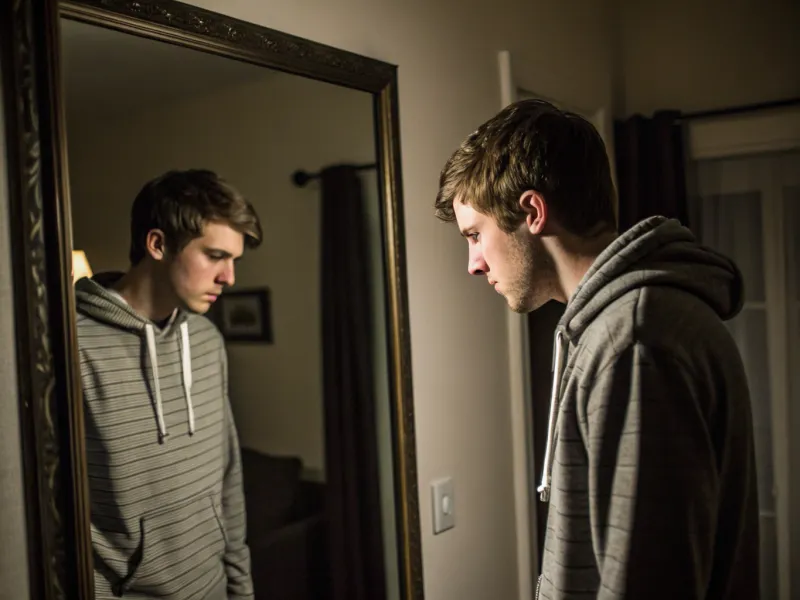
Low self-esteem can feel like a shadow that follows you everywhere, whispering doubts and fears. For those who grew up feeling unloved, self-worth can be tied to external validation, leaving them vulnerable to the opinions of others.
This lack of confidence can manifest in self-doubt and a reluctance to pursue dreams or opportunities. It’s like driving a car with the brakes on, never quite reaching full speed. But self-esteem isn’t about being perfect; it’s about recognizing your unique value.
Building self-esteem starts with acknowledging your strengths and accomplishments, no matter how small. Engage in activities that bring you joy and confidence. Surround yourself with people who believe in you and uplift your spirit. Remember, you are worthy of love and success, just as you are.
14. Fear of Intimacy

Intimacy can feel like a tightrope walk for those with an unloved childhood, balancing the desire for closeness with the fear of vulnerability. It’s the silent dance of wanting to connect but fearing the pain of exposure.
This fear isn’t a reflection of the absence of love but a protective measure against potential hurt. It’s like building a fortress to shield the heart, yet longing for someone to breach the walls. But remember, true intimacy is about trust and mutual understanding.
To overcome the fear of intimacy, start by building trust in relationships. Share your thoughts and feelings gradually, creating an environment of safety and acceptance. Understand that vulnerability is a strength, not a weakness, and that love can be a sanctuary, not a battlefield.
15. Constant Need for Reassurance

The need for reassurance can be like a bottomless cup, never quite filled. For those with an unloved childhood, it’s a quest for validation, seeking confirmation of love and acceptance from external sources.
This constant need can lead to clinginess in relationships, always seeking affirmation from others. It’s like being in a room full of people yet feeling alone, unless someone reassures you of your worth. But remember, true self-worth comes from within.
Cultivate inner confidence by focusing on your strengths and achievements. Engage in self-reflection and affirmations, reminding yourself of your inherent value. Surround yourself with supportive individuals who offer genuine encouragement. Remember, you are enough, even without external validation.
16. Difficulty Setting Boundaries
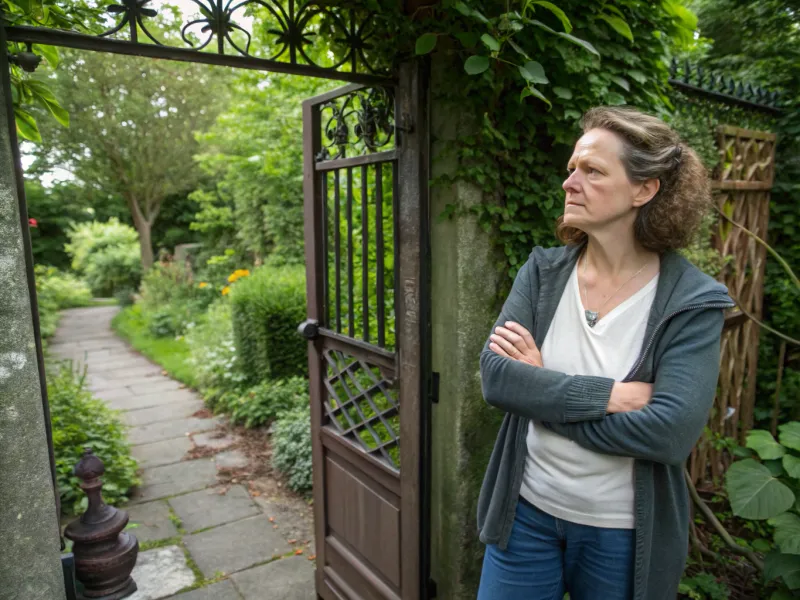
Setting boundaries can feel like a foreign language for those who grew up in an unloved environment. It’s the challenge of saying ‘no,’ of defining personal space, without guilt or fear of rejection.
This difficulty often stems from a place where love was conditional, making any assertion of self seem risky. It’s like being a doormat, letting people walk over you to avoid conflict. But remember, boundaries are not barriers—they’re bridges to healthier relationships.
Start by identifying your limits and practicing saying ‘no’ in small situations. Understand that setting boundaries is an act of self-care, not selfishness. Engage in open, honest communication with others, asserting your needs with confidence. Remember, your space and time are valuable, and it’s okay to protect them.
17. Indecisiveness

Indecisiveness can feel like standing at a crossroads, unsure of which path to take. For those with an unloved childhood, every decision can feel like a potential minefield, leading to hesitation and second-guessing.
This struggle often comes from a fear of making the wrong choice and facing criticism or disappointment. It’s like playing a constant game of ‘what if,’ unsure of the right answer. But remember, life isn’t a test with one correct solution—it’s an adventure with many possible roads.
To overcome indecisiveness, practice making small decisions quickly and confidently. Trust your instincts and remind yourself that it’s okay to make mistakes—they’re opportunities for growth. Embrace the uncertainty of life, knowing that each choice is a valuable learning experience.
18. Feeling Unworthy of Love

Feeling unworthy of love can be a heavy burden, like carrying rocks in your pockets. For those with an unloved childhood, this belief can become deeply ingrained, casting doubt on their own value.
This feeling often leads to self-sabotage in relationships, pushing people away for fear of inevitable rejection. It’s like building walls to protect a heart that believes it’s not deserving of affection. But remember, love isn’t earned; it’s freely given.
Challenge this belief by practicing self-compassion and kindness. Surround yourself with positive affirmations and supportive individuals who remind you of your worth. Engage in activities that nurture self-love and confidence, reinforcing the truth that you are worthy of all the love the world has to offer.
19. Over-Sensitivity to Criticism

Criticism can feel like a sharp sting for those with an unloved childhood, echoing past wounds of rejection and judgment. It’s the fear that any critique is a confirmation of inadequacy, a blow to fragile self-esteem.
This over-sensitivity can lead to defensiveness or withdrawal, as if building a fortress against perceived attacks. But remember, criticism is not a measure of your worth; it’s an opportunity for growth and improvement.
To cope with criticism, practice separating the feedback from your self-worth. Engage in open discussions about critiques, viewing them as tools for personal development. Remind yourself that your value is not diminished by others’ opinions, and that growth comes from embracing change with grace.
20. Difficulty Accepting Compliments

Compliments can feel like foreign currency for those with an unloved childhood, unfamiliar and hard to accept. It’s the discomfort of being acknowledged, fearing that praise is insincere or undeserved.
This difficulty often stems from low self-esteem, where positive feedback feels like an anomaly in a sea of self-doubt. But remember, compliments are not just words; they’re affirmations of your inherent value.
Practice accepting compliments graciously by simply saying ‘thank you.’ Reflect on the positive traits that others see in you, reinforcing your self-worth. Remember that you are deserving of praise, and that acknowledging your strengths is a step towards embracing your true potential.
21. Reluctance to Ask for Help

Asking for help can feel like admitting defeat for those with an unloved childhood, a sign of vulnerability they learned to avoid. It’s the belief that self-reliance is the only path to survival, even when the load becomes too heavy to bear alone.
This reluctance can lead to isolation and burnout, carrying burdens that could be shared. But remember, asking for help is not a weakness; it’s a strength that builds connection and support.
Practice reaching out for assistance in small ways, like asking a friend for advice or sharing a task. Embrace the idea that collaboration leads to greater achievements and deeper relationships. Remember, you are not alone in this journey, and it’s okay to lean on others.
22. Difficulty Maintaining Relationships

For those with an unloved childhood, maintaining relationships can feel like trying to hold water in cupped hands—difficult and often fleeting. It’s the fear of intimacy, the challenge of trust, and the struggle to believe they are worthy of lasting connections.
This difficulty often leads to a cycle of short-lived relationships, each departure reinforcing the belief that love is temporary. But remember, relationships are not about perfection; they’re about mutual understanding and growth.
Focus on building deeper connections by being present and engaged. Practice active listening and open communication, nurturing trust and respect. Remember, every relationship is a journey, and each one teaches you more about love and yourself.
23. Over-Dependence on Technology

In a world where human connection once felt risky, technology becomes a safe haven. For those with an unloved childhood, screens offer a controlled environment, free from the unpredictability of personal interactions.
Over-dependence on technology can create a barrier, isolating individuals from genuine human experiences. It’s like living in a digital cocoon, safe but disconnected. But remember, technology should enhance your life, not replace it.
Balance your screen time by engaging in face-to-face interactions and real-world activities. Practice digital detox days, where you unplug and reconnect with your surroundings. Remember, life’s richest moments often happen beyond the screen.
24. Self-Sabotage

Self-sabotage can feel like being your own worst enemy, setting traps that hinder your progress. For those with an unloved childhood, it’s a manifestation of deep-seated fears and insecurities.
This behavior often stems from the belief that success or happiness is undeserved, leading to actions that undermine your goals. It’s like building a house of cards only to blow it down yourself. But remember, self-sabotage is a learned behavior, not a destiny.
Start by identifying self-destructive patterns and their triggers. Practice self-compassion and forgiveness, allowing yourself to make mistakes without harsh judgment. Remember, you are worthy of success and happiness, and every step forward is a triumph over past barriers.
25. Fear of Failure

Failure can feel like a looming shadow, especially for those with an unloved childhood where mistakes were magnified and success felt scarce. It’s the fear that any misstep is a reflection of personal inadequacy.
This fear often leads to avoidance of challenges, choosing the safe path over opportunities for growth. It’s like walking a tightrope with a safety net that never lets you fall but also never lets you fly. But remember, failure is not the end; it’s a stepping stone to achievement.
Reframe your view of failure as a learning experience rather than a defeat. Embrace challenges with curiosity and courage, knowing that each attempt brings you closer to your goals. Remember, every great success story is built on a foundation of lessons learned from failure.
26. Chronic Anxiety

Anxiety can feel like an ever-present cloud, casting shadows over your day. For those with an unloved childhood, it’s often rooted in a world that felt unpredictable and unsafe.
Chronic anxiety can manifest as constant worry, racing thoughts, and a sense of impending doom. It’s like living in a state of heightened alert, always bracing for the next storm. But remember, anxiety is not a permanent state; it’s a response that can be managed.
Practice mindfulness and relaxation techniques to calm your mind and body. Engage in physical activities that release endorphins and promote well-being. Remember, you have the strength to weather any storm, and inner peace is within your reach.
27. Difficulty Accepting Love
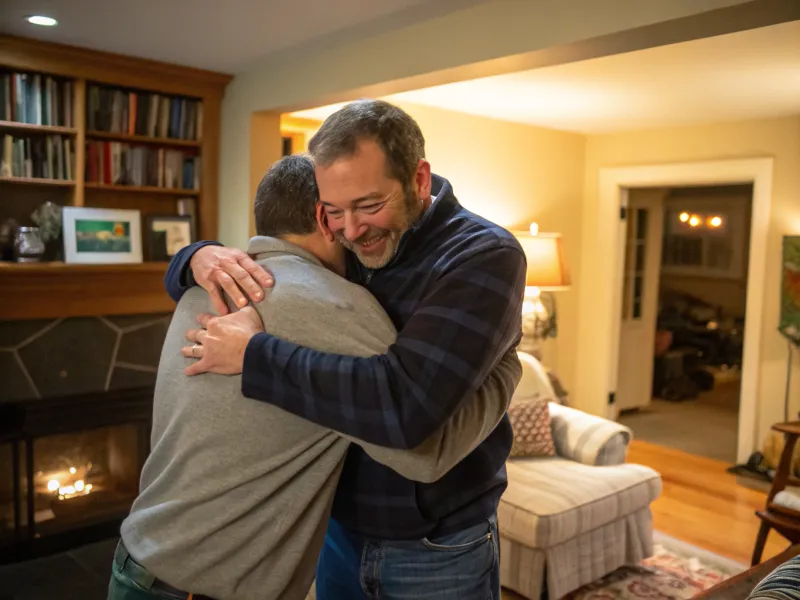
Accepting love can feel like an uphill battle for those with an unloved childhood, where affection felt conditional or absent. It’s the skepticism that love is genuine or lasting.
This difficulty can lead to pushing people away, fearing that their love is fleeting or insincere. It’s like holding a precious gift at arm’s length, unsure if it’s truly yours to keep. But remember, love is abundant, and you are deserving of it.
Open your heart to love by acknowledging your fears and challenging them. Practice gratitude for the love you receive, allowing yourself to accept it fully. Remember, love is not a transaction; it’s a gift meant to be cherished and shared.
28. Procrastination
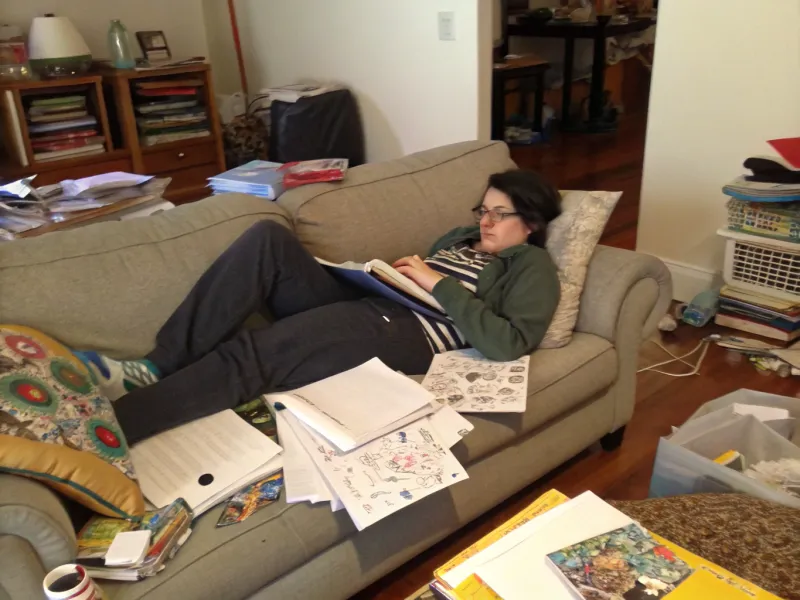
Procrastination can feel like being stuck in quicksand, where time slips away and tasks pile up. For those with an unloved childhood, it’s often a way to avoid potential failure or criticism.
This behavior leads to stress and missed opportunities, perpetuating a cycle of guilt and self-doubt. It’s like watching the clock tick, knowing time is running out, yet feeling paralyzed. But remember, procrastination is a habit that can be broken.
Start by breaking tasks into manageable steps and setting realistic deadlines. Focus on progress rather than perfection, celebrating small achievements. Remember, taking action leads to momentum, and momentum leads to accomplishment.
29. Constant Need for Control

Control can become a lifeline for those with an unloved childhood, where chaos reigned and predictability was scarce. It’s the need to manage every detail, fearing that any slip could unravel the fragile sense of stability.
This constant need can lead to anxiety and exhaustion, as if juggling a dozen balls in the air with no room for error. But remember, control is an illusion, and life’s beauty often lies in its unpredictability.
Practice letting go of minor details and embracing spontaneity. Trust in the natural flow of life, accepting that not everything needs to be planned or perfect. Remember, balance is found in flexibility, and true strength lies in adaptability.
30. Feeling Undeserving of Success

Feeling undeserving of success can be like carrying a secret burden, questioning your achievements and fearing they’re unearned. For those with an unloved childhood, this belief can overshadow accomplishments and breed self-doubt.
This feeling often leads to self-sabotage, minimizing achievements and avoiding recognition. It’s like hiding your light under a bushel, afraid to let it shine. But remember, success is not a fluke; it’s the result of hard work and talent.
Acknowledge your accomplishments and celebrate your victories, no matter how small. Surround yourself with supportive individuals who recognize your worth and encourage your growth. Remember, you’ve earned your success, and it’s time to own it with pride.
31. Difficulty Letting Go of the Past

Letting go of the past can feel like releasing a balloon filled with memories, floating away into the unknown. For those with an unloved childhood, this struggle can be a tether, anchoring them to experiences that shape their present.
This difficulty often stems from unresolved emotions and unhealed wounds, replaying past hurts like a never-ending film. But remember, the past is a chapter, not the whole story.
Begin by acknowledging your past experiences and the lessons they’ve taught you. Practice forgiveness, not to erase the past, but to free yourself from its hold. Remember, the future is a blank canvas, and you have the brush to paint it anew.
32. Fear of Being Vulnerable

Vulnerability can feel like standing on the edge of a cliff, teetering between safety and the unknown. For those with an unloved childhood, opening up is a risk, fearing exposure and rejection.
This fear often leads to guarded hearts, protecting emotions from potential harm. But remember, vulnerability is not a weakness; it’s a doorway to deep connection and understanding.
Embrace vulnerability by taking small steps to share your thoughts and feelings with trusted individuals. Recognize that opening up leads to greater intimacy and authenticity in relationships. Remember, strength is found in honesty, and courage in being true to yourself.
33. Feeling Isolated Even Among Friends

Isolation can feel like being in a crowded room yet standing alone, a familiar feeling for those with an unloved childhood. It’s the belief that no one truly understands or sees you, a shadow of past neglect.
This feeling often leads to loneliness and withdrawal, even when surrounded by friends. But remember, connection is not about proximity; it’s about presence and understanding.
Engage with those around you, sharing your thoughts and emotions to build deeper bonds. Practice active listening and empathy, fostering genuine connections. Remember, you are not alone, and true friendship can bridge the gap of isolation.
34. Reluctance to Forgive

Forgiveness can feel like setting down a heavy burden, freeing yourself from the weight of past hurts. For those with an unloved childhood, reluctance to forgive can stem from a fear of vulnerability and being hurt again.
This reluctance often leads to holding grudges and harboring resentment, like carrying a stone that only grows heavier. But remember, forgiveness is not about forgetting; it’s about releasing yourself from anger’s grip.
Practice forgiveness through self-reflection and empathy, understanding that everyone is human and makes mistakes. Let go of past grievances, allowing yourself to heal and move forward. Remember, forgiveness is a gift you give to yourself, a path to inner peace.
35. Constantly Seeking Approval

Seeking approval can feel like chasing an endless horizon, a quest for validation that never quite satisfies. For those with an unloved childhood, approval becomes a measure of self-worth, a way to fill the void left by absent affection.
This constant need can lead to relying on others for self-validation, diminishing your own sense of identity. But remember, true worth is found within, not in external accolades.
Cultivate self-acceptance by recognizing your achievements and celebrating your unique qualities. Engage in activities that build confidence and foster independence. Remember, you are enough, and your worth is inherent, not determined by others’ opinions.
36. Struggling to Celebrate Yourself

Celebration should feel joyful, but for those with an unloved childhood, it often feels uncomfortable or even undeserved. When you’ve grown up believing that your achievements don’t matter—or worse, that they threaten the people around you—it’s hard to clap for yourself without hearing a critical inner voice.
You downplay your wins, shift the spotlight to others, or feel awkward receiving compliments. It’s not that you’re ungrateful—it’s that praise doesn’t quite compute the way it should.
The truth is, your milestones matter. Start small: write down your wins, however tiny, and take a moment to acknowledge them. Buy yourself a little treat, share your joy with a friend who celebrates with you, not in spite of you. Because your growth, your progress, your joy—they’re worth the confetti.
37. Feeling Responsible for Others’ Emotions

If you grew up in a home where your mood had to match the room—or worse, where you had to “keep the peace”—chances are you’ve been conditioned to feel responsible for everyone’s emotional weather.
You become the fixer, the soother, the emotional sponge. Someone’s upset? It must be your fault. Someone’s quiet? You rack your brain for what you did wrong. You end up carrying burdens that were never meant to be yours.
Here’s the truth: you are only responsible for your feelings, not anyone else’s. Start by noticing the urge to rescue or take blame, and instead, let it pass. Ground yourself in the reminder that people are allowed to feel what they feel—and it doesn’t make you the villain. It just makes you human, with your own emotional garden to tend.







